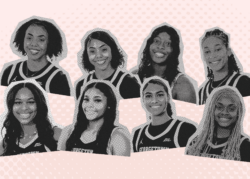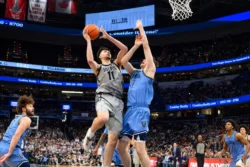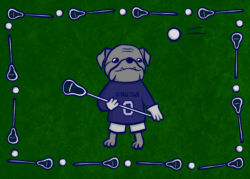Georgetown’s men’s basketball office is in the same place as last year, but it looks different. The deflated basketball made famous by former Head Coach John Thompson, Jr. to remind players of the emptiness of a basketball-only life, still remains in an enclosed case on the wall. But it is just one of the few remnants left after last season’s abysmal 13-15 season, which led to the firing of Craig Esherick.
What also remains is a sense of tradition in a program that was once among the most accomplished in the country. It came as little surprise last April when John Thompson III, Thompson Jr.’s son, was announced as the new Head Coach of men’s basketball. Upon his arrival Thompson immediately sought to create an environment that would signal how different 2004 would be.
One of Thompson’s first moves was remodeling the office by eliminating the small offices that previously characterized the space. What remains are even smaller offices and a large team meeting room where the coaches can spend their days, working and communicating to figure out the best strategies.
Thompson took the idea from his time coaching at Princeton where he spent five years as an assistant and four as the Head Coach. His first year was spent working with the legendary college coach Pete Carrill, who also coached him during four seasons at Princeton. Carrill employed the use of a large team meeting room where the coaches could talk shop.
“Our office setup was extremely conducive to basketball thought,” Thompson recalled. “The setup was one big room, so there was no need for meetings because you were always in the same room. A lot of time was spent at the chalkboard, going over things, changing and tweaking.”
Bill Carmody served as an assistant to Carrill with Thompson in 1995 before Carrill retired the following season and Carmody took over the reins. Carmody served as Head Coach for four seasons before leaving for Northwestern, and leaving the team to Thompson.
“It was a real community thing,” Carmody said. “We all had our chairs and then it was just talking all the time about basketball. We all had our own ideas and we threw them around. It would get heated sometimes, too.”
“It’s something I’ve tried to do at Northwestern,” he added. “It’s important to combat the image of the coach as a CEO with all the say.”
For those familiar with Georgetown basketball, the name Thompson might not necessarily evoke images of an egalitarian hierarchy within his office. But then again, if you were expecting John Thompson III to be a carbon copy of John Thompson, Jr., you may be in for a rude awakening. Still, the similarities are there. Senior guard RaMell Ross was recruited by the elder Thompson, and after being forced to redshirt for two seasons due to injuries, he now has a chance to play for the younger Thompson.
“Both coaches stress working hard and playing hard,” Ross said. “He definitely resembles his father in his demeanor, that calmness and coolness. Then when it’s time, he’ll turn into a new person and everyone will get in line.”
There is, however, another equally important influence on Thompson: Carrill. It was Carrill who recruited Thompson as a senior at Gonzaga High School in D.C., and eventually coached him at Princeton. It was Carrill who lured Thompson into coaching. It is Carrill who Thompson will always mention in the same sentence as “Pops” when anyone asks how much his father has influenced him.
Thompson’s official visit to Princeton was an awakening. When everyone else was recruiting him and massaging his ego, Carrill sat down the son of one of his most respected colleagues and immediately told him the things he would need to improve on if he wanted to avoid playing on the JV squad.
“Carrill was by far the best teacher I had,” Thompson said.
At Princeton, Thompson never played a game for the JV, and instead emerged as a starter as a first-year. The experience was a little more than he expected in his first year, but Carrill was always there. Although it took some time for him to understand Carrill’s style, Thompson eventually saw the coach’s genuineness and how he always had Thompson’s best interests at heart.
Thompson would finish four stellar years at Princeton third on the program’s all-time assist leaders, foreshadowing the emphasis he now places on team unity. Graduating in 1988 with a degree in politics, Thompson also left Princeton with a profound sense of commitment instilled earlier by his father, and sharpened by Carrill.
“It’s not a coincidence that if you look at the close-knit group that is former Princeton players, they are always back and a part of the program. Coach is that centerpiece,” Thompson observed. “It’s very similar with former players here. There’s a strong bond, and the guys are still a part of the program.”
It would take seven years for Thompson to return to his alma mater. After college, he wanted to pursue a career in something other than basketball.
“It was not wise, looking back at it,” Thompson said with a laugh.
His first job was with Ford Motor Company in their Dealer Development Program which paired him with the owner of a local dealership as an apprentice.
“I was fortunate,” Thompson said. “The guy I worked for, Michael Burke, let me be extremely active in the day-to-day management of the car dealership. You’re one year out of school, and you’re running a car dealership, so it was a great experience. At the same time, cars are not my thing. I think you need to be passionate about what you’re doing.”
What followed would be a job with Scoreboard, a sports marketing firm that handled the marketing aspects of several prominent athletes. Thompson thought the job would pacify his longing to be involved with athletics. Then came what as supposed to be the height of his career.
“We had just finished negotiations on a big deal with Shaq,” he recalled. “The meeting was finished, the contracts were signed, and the other party left, and I remember being there with our negotiating team, slapping five. I thought to myself that if this is as good as it gets, I need to find something else to do. It was a lot of money, we did well, but the excitement wasn’t there. With athletics, the high highs and the low lows are tough to compare.”
Soon after, Carrill called and urged Thompson, as he puts it, “To stop wasting his time.” Although Thompson had received offers to coach before, the opportunity to work with Carrill was an offer he couldn’t refuse.
Thompson arrived as an assistant in 1995 just as the Tigers were preparing for a five-year run that would culminate in five consecutive postseason tournament appearances, including 1996’s spectacular upset of defending National Champion UCLA in the first round of the NCAA tournament.
“It was a learning experience, but it was also a good time,” Thompson recalled. “We had a pretty good run there. It was a lot of fun and we won a lot of games. I was fortunate to work with Bill Carmody and Joe Scott, in addition to Coach Carrill.”
It was at Princeton where Thompson culled his own persona from the coaching philosophies around him, not necessarily Carrill’s or his father’s exclusively, but a fusion of two of basketball’s greatest minds.
Thompson cited Carrill’s deference to the observations of his players as a strength that he has inherited. He routinely stops practice to ask individual players for their critiques on what the team is doing.
“I see things on the sidelines, and I feel what is going on, but there will be times when I’m going to come into a timeout and ask the guys ‘What do you want to do?’ and you better have some thoughts,” Thompson said. “As an assistant, and as a player, I took that away.”
Carmody expressed a similar thought.
“At Princeton, I learned about how to go about my business,” he said. “You be yourself, and coach according to your personality. There’s a lot of fluff that can distract you, but Pete never cared, and you take that away.”
And what do the players think of their new coach and a more cerebral approach to basketball?
“Coach is a very chill, laid-back kind of guy, but you know when he means business, he means business,” junior guard Ashanti Cook said. “I’ve had nothing but positive things from him.”
Owens agreed.
“He preaches hard work, and that if we work hard anything is possible,” he said.
By most accounts Thompson looks like his father, but he dismisses the comparisons-not as unfair, but as pointless. It is 2004, not 1984.
“I’ve been John Thompson’s son all my life,” Thompson said. “I’m pretty comfortable with that. Ever since I was playing high school ball, I got asked about being John Thompson’s son. When I was coaching Princeton, I was asked about being John Thompson’s son. Obviously, it’s hyped coaching at Georgetown.”
Thompson said that trying to compare this team to the legendary 1984 National Champions team would drive him crazy. Thompson is more concerned with making the story about this team and not about what the media may claim would be restoring his father’s legacy.
“Let’s just take this group of guys and work as hard as we can and improve,” Thompson said. “As you progress through the season, you pick your head up and see where you stand relative to the past, and everyone else, but it’s really about this group right here.”





